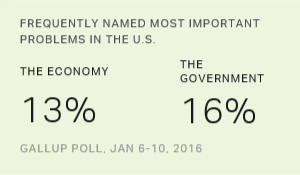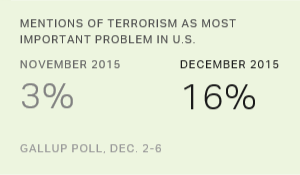Story Highlights
- 17% mention economy, 15% dissatisfaction with government
- Mentions of unemployment remain elevated
- 27% are satisfied with the way things are going in the U.S.
PRINCETON, N.J. -- The economy and dissatisfaction with the government, two issues regularly at the top of Gallup's monthly most important problem list, rank as Americans' top issues in March. Mentions of unemployment are in the double digits for a second consecutive month after hitting a seven-year low in January.
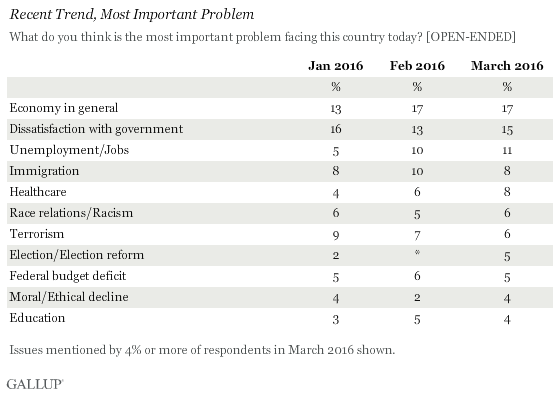
The results are based on Gallup's March 2-6 poll. Beyond the top three problems, at least 5% of Americans mention several other issues. These include immigration, healthcare, race relations, terrorism, the election and the federal budget deficit.
Mentions of the election, at 5%, are not high in an absolute sense, but they are the highest since Gallup began tracking the category in 2001. The prior high was 2% on several occasions, usually shortly after an election took place. Many of the responses in the current survey specifically mention Donald Trump and his role in the election. Those citing the election as the most important problem are primarily independents and Democrats.
The greatest party differences in perceptions of the most important problem facing the nation are on the economy, given a sharp increase in Republican mentions of it this month. Currently, 28% of Republicans say the economy is the most important problem, up from 16% in February and 8% in December. By contrast, the percentages of independents and Democrats naming the issue are currently 16% and 12%, respectively, mostly consistent with the past six months. Republicans' heightened concern about the economy could reflect their agreement with Republican presidential candidates' rhetoric about the economic problems the country is facing.
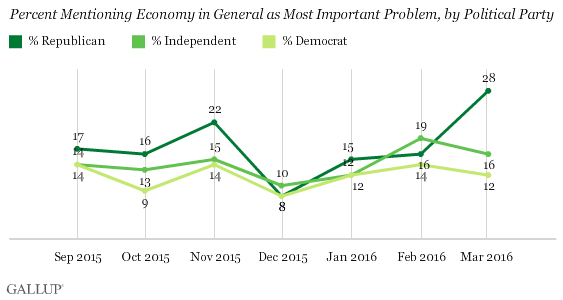
Other notable party differences in perceptions about the country's top problem are Republicans' greater likelihood than Democrats to mention immigration, terrorism and national security. And Democrats are more likely than Republicans to name race relations and the government.
Roughly One in Four Satisfied With State of Nation
The poll also finds 27% of Americans saying they are satisfied with the way things are going in the country, including 44% of Democrats and 25% of independents, but only 10% of Republicans.
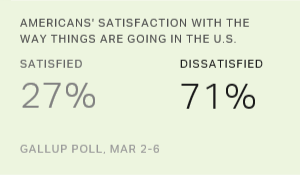
The current satisfaction level among all Americans is in line with what Gallup has measured the last four years, but significantly below the historical average of 37%.
Below-average satisfaction at the time of an election is often a sign of trouble for the incumbent presidential party's ability to win, as in 1980 (19%), 1992 (22%) and 2008 (13%). However, President Barack Obama won re-election in 2012 when satisfaction was only slightly better (33%) than it is now.
The president's party typically has won elections when satisfaction was above the historical average, which was the case in 1984 (48%), 1988 (56%), 1996 (39%) and 2004 (44%). The exception was in 2000 when the Democrats lost the election by virtue of the Electoral College vote even though satisfaction was 62%.
Implications
Americans remain much more dissatisfied than satisfied with the state of the nation, and the economy and the way the government is operating are two of the major issues of concern. The economy and the government have consistently been named as the most important problems facing the country over the past five years.
Satisfaction levels usually do not improve greatly over the course of a presidential election year, but they did improve in 1988, 1996 and 2012. With current levels of satisfaction just below what they were in November 2012, even a slight increase may be enough to improve Democrats' chances of retaining the White House.
Historical data are available in Gallup Analytics.
Survey Methods
Results for this Gallup poll are based on telephone interviews conducted March 2-6, 2016, with a random sample of 1,019 adults, aged 18 and older, living in all 50 U.S. states and the District of Columbia. For results based on the total sample of national adults, the margin of sampling error is ±4 percentage points at the 95% confidence level. All reported margins of sampling error include computed design effects for weighting.
Each sample of national adults includes a minimum quota of 60% cellphone respondents and 40% landline respondents, with additional minimum quotas by time zone within region. Landline and cellular telephone numbers are selected using random-digit-dial methods.
View survey methodology, complete question responses and trends.
Learn more about how the Gallup Poll Social Series works.
